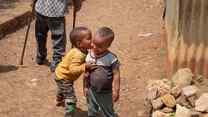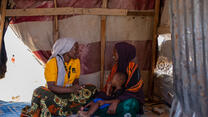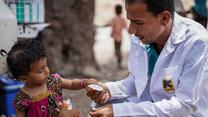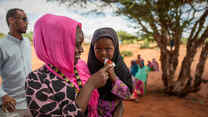WHO WE ARE
The mission of the International Rescue Committee (IRC) is to help people whose lives and livelihoods are shattered by conflict and disaster to survive, recover and gain control of their future. Our vision is that the IRC will lead the humanitarian field by implementing high- impact, cost-effective programs for people affected by crisis, and we will shape global policy and practice by sharing our learning and experience with others. All IRC programs are designed to achieve meaningful change in people’s health, safety, education, economic wellbeing and ability to influence the decisions that affect their lives.
As part of these efforts, we work to implement proven interventions to prevent and treat non-communicable diseases (NCDs).
WHY OUR WORK MATTERS
Non-communicable diseases (NCDs) are long-term conditions that cannot be passed from one person to another. According to the World Health Organization (WHO), 15 million people die prematurely before the age of 70 from NCDs every year, and 85% of these deaths occur in low- and middle-income countries. NCDs now represent the leading causes of death and disability worldwide including in many crisis-affected areas where there’s often a lack of adequate health care and health systems in place to handle timely diagnosis and treatment.
Crisis-affected populations are at risk of exposure to a combination of trauma and daily stressors including mental health conditions which can exacerbate NCDs. In some settings, refugees largely live in urban areas rather than camps, which can further contribute to risk-factors related to diet, physical activity and tobacco use. Humanitarian response has traditionally focused on treating and preventing communicable diseases and physical trauma. Increasingly, however, humanitarian agencies, academics and governments have been challenged with how to effectively tackle NCDs in these situations.
WHAT WE DO
The IRC is providing care for crisis-affected clients living with NCDs, integrating NCD programming into recovery and development efforts across different contexts, undertaking research projects and developing innovative approaches to improve the quality of care for the people we serve.
- Emergency Response: During crises, the IRC works to identify patients who have already been diagnosed with NCDs and ensure they receive uninterrupted treatment and avoid developing complications; help people prevent NCDs; and strengthen health systems to address this growing burden of disease. The IRC facilitates the use of diagnostic and treatment services by setting up laboratories and ensuring staff capacity to manage NCDs at primary health care facilities. Because the path from emergency to recovery is non-linear and often requires development and humanitarian efforts at the same time, the IRC carries out the direct implementation of service while strengthening the capacity of host-country institutions to provide quality services to affected communities.
- Primary Care Facilities: At primary health care facilities, the IRC prioritizes addressing conditions that cause the highest burden of disease such as hypertension, diabetes, asthma, epilepsy, chronic obstructive pulmonary diseases and chronic heart disease. Much of the NCD work at IRC-supported health facilities focuses on ensuring access to services through the provision of diagnostics and medicines at the health facility level. We also work to increase demand for services by engaging communities using client feedback and responsiveness mechanisms, and by ensuring high quality services.
- Community-level support: The IRC aims to promote the adoption of healthy behaviors at the individual, family and community level that can prevent disease and the need for treatment, particularly in more stable settings. We integrate NCD care and support into community health programs; we link individuals living with NCDs and their families with economic opportunities to ensure the costs of prevention and treatment do not overwhelm limited family resources; we provide individuals with the skills to prevent NCDs and adhere to treatment; and we work with communities to foster an enabling environment for patients to adopt healthy behaviors.
- Research and Innovation: The IRC is working to strengthen the evidence base on how to effectively address NCDs in low resource settings with a focus on examining the burden of NCDs, the effectiveness of interventions that include new tools and diagnostics, the cost of treatment, optimization of drug distribution, implementation of programs, including the value added of m-health and electronic medical records in low and middle income settings (including humanitarian and fragile contexts).
- Cross-sector Integration: The IRC examines linkages between NCDs and other areas of work related to health, safety and economic well-being. Through an evidence-based and outcome-oriented approach, the IRC can recognize and address linkages among NCDs such as pregnancy-induced hypertension and gestational diabetes mellitus. In children, the focus is on ensuring malnutrition treatment and prevention efforts are linked with programs addressing childhood diabetes. Efforts promoting environmental health consider the impact on patients with chronic respiratory diseases while linkages with economic recovery and development programming are being further explored including through the IRC’s commitment to cash programming in humanitarian settings.



